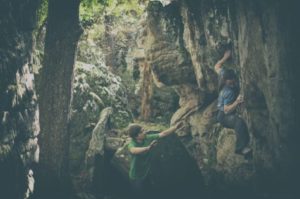TUCSON, Ariz. — Bouldering, a type of rock climbing sans rope or harness, has previously been shown to improve one’s physical health and reduce stress, but it can also proffer psychological benefits, a new study finds.
Researchers at the University of Arizona recruited more than 100 individuals for a bouldering intervention experiment in Germany as part of a larger study. Notably, many German hospitals have begun to use rock climbing as a therapeutic treatment.

“Bouldering, in many ways, is a positive physical activity,” says study co-author Eva-Maria Stelzer in a university press release. “There are different routes for your physical activity level, and there’s a social aspect along with the feeling of an immediate accomplishment when bouldering.”
The participants were split into two groups— one of which began climbing immediately, and the other of which was instructed to wait. Each participant would end up bouldering at least three hours a week over the course of eight weeks.
Participants also had their mood measured during the study via two commonly-used inventories: the Beck Depression Inventory and the SCL-90-R.
The researchers found that the group that immediately began the rock climbing regimen improved their scores on the Beck Depression Inventory by 6.27 points over the course of the study, while the group that was instructed to wait only saw a 1.4 point improvement.
Both scores represent a significant reduction in depressive symptoms, although the former was more indicative of a substantial change.
“Patients enjoyed the bouldering sessions and told us that they benefited greatly,” says co-author Katharina Luttenberger, a psychometrics expert at the University of Erlangen in Germany. “Since rumination is one of the biggest problems for depressed individuals, we had the idea that bouldering could be a good intervention for that.”
Adds Stelzer: “You have to be mindful and focused on the moment. It does not leave much room to let your mind wonder on things that may be going on in your life — you have to focus on not falling.”
Considering how 18 percent of American adults suffer from an anxiety disorder, including depression, this study presents a new possible intervention for treatment.
The full study, which also included instruction on meditation, mindfulness, and building positive social interactions, lasted for 24 weeks.
Ultimately, the researchers believe that because bouldering is accessible to people at a range of physical abilities, its psychological benefits may be especially beneficial when used in concert with cognitive behavioral therapy.
“Bouldering not only has strong mental components, but it is accessible at different levels so that people of all levels of physical health are able to participate,” says Stelzer. “I hope this study and future studies are able to impact a life.”
The study’s findings were presented at the 29th annual Association for Psychological Science Convention.
